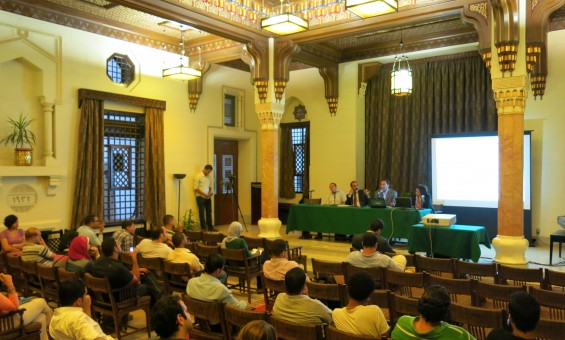
Symposium | Developing A Better Understanding of Social Accountability
Aim of the Symposium
In light of these challenges, TADAMUN organized a symposium on June 26, 2013 to develop a better understanding of social accountability mechanisms and explore their potential role as a tool to improve the standards of public service provision and ensure the equitable distribution of services across the city. The symposium also addressed the importance of government transparency and the right to access information to enable citizens to hold the government accountable for its urban planning policies, implementation of urban development projects, and management of urban areas.
To this effect, the symposium illustrated recent efforts of some governmental and non‐governmental agencies active in this field in Egypt. It also demonstrated some successful and effective local and international practices concerning social accountability and access to information. This symposium was in partnership with the Department of Public Policy and Administration, School of Global Affairs and Public Policy – American University in Cairo.
Session 1: Social Accountability – Concepts & Tools
The first session included three presentations addressing the concepts and tools of social accountability. Social accountability was introduced as a component of the good governance framework and how it manifests in local administration. The first two speakers, Dr. Khaled Abdelhalim and Ms. Dalia Bayoumi, shared the results of governance and services evaluation projects, as well as residents’, public servants’ and Local Popular Council (LPC) representatives’ expectations and beliefs about accountability. The final speaker, Mr. Amr Lashin underlined the importance of access to information and presented tools of social accountability successfully used by NGOs in several governorates. Throughout the session, there was an emphasis on the need to increase the awareness and capacity of governmental institutions and LPCs, not only citizens. This session was presented by:
Session 2: Social Accountability – Implementation Obstacles & Challenges
LPCs are one of the mechanisms established to ensure the accountability of local administration to citizens, this session discussed the obstacles citizens and CSOs face to demand this accountability and how the legal framework is applied in reality. It also showcased how successful local practices of social accountability can improve urban development. The talks also explored links between social accountability, transparency, and the right to access information in Egypt and internationally. The presenters in this session were:
A discussion followed, welcoming remarks from the floor to open the dialogue between the citizens and CSOs on one hand, and governmental and non-governmental representatives (the speakers) on the other hand, regarding the feasibility and means of implementing social accountability in Egypt, as well as the obstacles and challenges ahead.









Comments